
Grand Inquisitor
For the first time in company history, the Met presents the original five-act French version of Verdi’s epic opera of doomed love among royalty, set against the backdrop of the Spanish Inquisition. Patrick Furrer leads a world-beating cast of opera’s leading lights in this March 26 performance, including tenor Matthew Polenzani in the title role, soprano Sonya Yoncheva as Élisabeth de Valois, and mezzo-soprano Elīna Garanča as Eboli. Bass Günther Groissböck and bass-baritone John Relyea are Philippe II and the Grand Inquisitor, and baritone Étienne Dupuis rounds out the all-star principal cast as Rodrigue. Verdi’s masterpiece receives a monumental new staging by David McVicar that marks his 11th Met production, placing him among the most prolific and popular directors in recent Met memory. This live cinema transmission is part of the Met’s award-winning Live in HD series, bringing opera to movie theaters across the globe.

Gurnemanz

The priest
Newman's poem tells the story of a soul's journey through death, and provides a meditation on the unseen world of Roman Catholic theology. Gerontius (a name derived from the Greek word geron, "old man") is a devout Everyman. Elgar's setting uses most of the text of the first part of the poem, which takes place on Earth, but omits many of the more meditative sections of the much longer, otherworldly second part, tightening the narrative flow.

Benjamin Britten’s Billy Budd will be performed in Norway for the very first time! This is an opera set in a hard masculine environment, about repressed passions and the weight of guilt - but also about rebellion, the power of beauty and about release. Director of Opera Annilese Miskimmon herself directs this masterpiece, featuring an exclusively male cast. Director Annilese Miskimmon and Set and Costume designer Annemarie Woods, take us onto a submarine during the Vichy regime in 1940s France. Here we meet a close and claustrophobic environment, controlled by sailors’ discipline and the meaningless necessity of war.

Duc Barbe-Bleue
Running through Bartók’s disenchanted tale, whose haunting music was initially condemned as unplayable, and the expression of despair in Poulenc’s monologue, the director Krzysztof Warlikowski perceives a shared dramatic thread, a shared feminine consciousness and a shared sense of imprisonment and suffocation: for the woman who penetrates the confines of Bluebeard’s castle and Elle, the woman who clings to a telephone conversation with a man as the only thing worth living for, are condemned to share the same fate. And this man she speaks to, does he really exist? Unless the director has interpreted Cocteau’s words to the letter and the telephone has become a “terrifying weapon that leaves no trace, makes no noise”…

Jacopo Fiesco
The dashing corsair Simon Boccanegra and Maria, daughter of the nobleman Jacopo Fiesco, have fallen in love and had an illegitimate daughter. The child has disappeared from her foster-home. Boccanegra returns to Genoa to break the news to Maria, and learns of her death as a crowd, led by the plebeian Paolo Albiani, proclaim him Doge of Genoa. Performed at the Teatro di San Carlo, Torino on October 10th, 2017.

King Marke
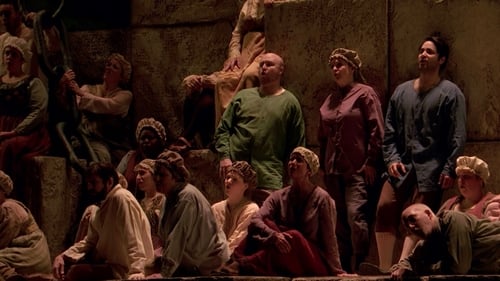
Zaccaria
Nabucco, King of Babylon, takes Jerusalem in his war with the Israelites – but his daughter Fenena loves the Israelite Ismaele. She releases their prisoners, leading her vengeful half-sister Abigaille to plot to take power. Nabucco declares himself a god and is struck by a bolt of lightning. Abigaille tricks the now feeble king into signing a death warrant for the Israelites, including Fenena and Ismaele. Nabucco prays to the God of Israel for forgiveness; his sanity is restored and he saves the prisoners from death. He converts himself and his people, while Abigaille commits suicide.

Water Sprite
Renée Fleming sings one of her signature roles, the title character in Dvořák’s sumptuously melodic Rusalka. The story of the opera, which is about a water spirit’s tragic romance with a human prince, is drawn from several folktale sources including Hans Christian Andersen’s “The Little Mermaid.” Star conductor Yannick Nézet-Séguin leads a cast that also includes Piotr Beczala as the handsome Prince whom Rusalka yearns to love; Dolora Zajick as the cackling swamp witch Ježibaba; Emily Magee as the Foreign Princess, Rusalka’s rival; and John Relyea as Rusalka’s father, the Water Sprite.

Bertram
Recorded live at the Royal Opera House, December 2012. Daniel Oren conducting Royal Opera House Orchestra and Chorus. A grand opera that dominated the stages of Europe for most of the 19th century, Robert le diable is a masterpiece. Director Laurent Pelly breathes new life into Giacomo Meyerbeer's great spectacle and audaciously entertaining moral fable, in this colourful new staging for The Royal Opera.
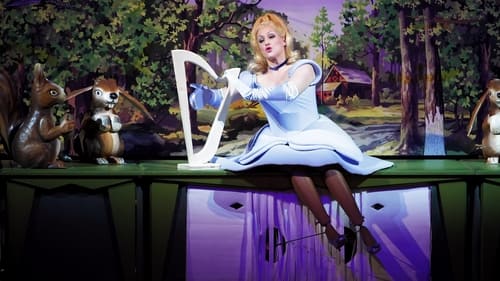
Lindorff / Coppélius / Miracle / Dapertutto
Live performance, Bayerische Staatsoper, 2011. The Tales of Hoffmann (French: LES CONTES D'HOFFMANN) is an opéra fantastique by Jacques Offenbach that combines three short stories by E.T.A. Hoffmann into a haunting whole: a melancholy poet reflects on three women he loved and lost in the past: a mechanical performing doll, a Venetian courtesan, and the consumptive daughter of a celebrated composer. One of the questions this opera poses for any director is how to link the 'tales' of Hoffmann's three lost loves together and knit them satisfactorily into the Prologue and Epilogue. In this production, Richard Jones solves the puzzle by turning it into an autobiographical journey which ends with a grand meet-up of all the characters Hoffmann has encountered: for once, Hoffmann is not presented as a rollicking kind of drunken story-spinner, but rather a sad-eyed, sobered-up depressive, who reaches for the bottle only because his disastrous love life has gone wrong yet again.

Alidoro
"Irresistible" (Opera News) rising-star mezzo Elina Garanca triumphs as Rossini's Cinderella in this delightful Metropolitan Opera production. "As close to pure joy as you will find in a big-time opera house" (New Yorker), conquering audiences and critics alike, "Garanca has a gorgeous voice that she uses with exceptional skill, melting tenderness; but when the part calls for coloratura fireworks, she unleashes a flawless technique and ringing high notes of impressive power" (Associated Press). Filmed in High Definition Widescreen.
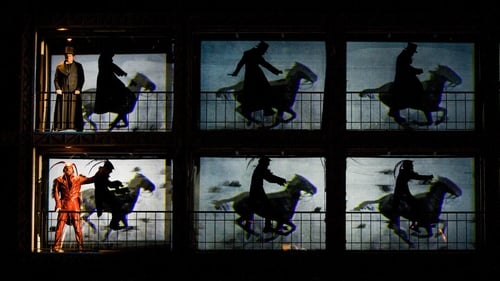
Méphistophélès
Radiant mezzo-soprano Susan Graham and dashing Italian tenor Marcello Giordani are unlucky lovers in La Damnation de Faust, Hector Berlioz’s classic take on dancing with the devil.
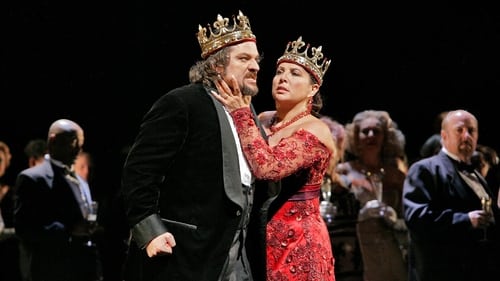
Banquo
Verdi’s admiration for Shakespeare led to such masterpieces as Othello and Falstaff, and if the earlier Macbeth isn’t on their exalted level it’s still a powerfully dramatic opera that hews closely to the original’s story line. The MET’s production retains the dark aura of the opera while updating it to a vaguely post-modern context. So the witches are bag ladies in various stages of decrepitude, with children in tow. The Banquet Scene features lowered chandeliers, a plethora of chairs, and a slew of extras dressed in tuxedos and party gowns. Macbeth sports a leather coat, the soldiers are in drab brown uniforms and seem to have fingers on their triggers even when they’re supposed to be in non-threatening situations. Director Adrian Noble also has Lady Macbeth do an inordinate amount of writhing around and singing from a lying-down position, adding to the feeling that a less interventionist directorial hand might have generated more impact.

Sir Giorgio
It's hard to imagine a video opera collection without this superbly sung MET production of Bellini's I Puritani. Not that it's perfect by any means, but its excellences--most especially Anna Netrebko's electrifying singing and acting of Elvira--banish carping about other aspects of this memorable night at the opera. Netrebko is fragile from the start, her facial expressions and hand movements immediately conveying the girl's vulnerability. She has a mad scene in each act; the first when she realizes her fiancé has disappeared with another woman, the third, in the final act, a brief relapse when her returned fiancé is taken by the army to be executed. But it's in the second act that the real fireworks occur, with a Mad Scene that rivals Donizetti's Lucia for bel canto primacy. Here, Elvira is first heard off-stage, after the chorus has informed us that she's deranged. She enters wearing her wedding gown and begins Qui la voce in a voice as frail as her psyche.
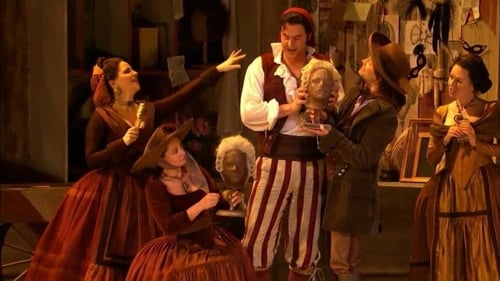
Don Basilio
Audiences went wild for Bartlett Sher’s dynamic production, which found fresh and surprising ways to bring Rossini’s effervescent comedy closer to them than ever before. The stellar cast leapt to the challenge with irresistible energy and bravura vocalism. Juan Diego Flórez is Count Almaviva, who fires off showstopping coloratura as he woos Joyce DiDonato’s spirited Rosina—with assistance from Peter Mattei as the one and only Figaro, Seville’s beloved barber and man-about-town.

Masetto
Live performance at the Metropolitan Opera in 2000.













